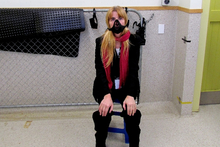Opinion piece of City Vision Councillor for Albert-Eden- Roskill, Cathy Casey. Published in the NZ Herald, 5 June 2013
Hundreds of unwanted animals end their lives in a sterile room awaiting destruction, writes Cathy Casey.
Muzzled and waiting in a sterile room for the vet’s lethal injection, this was the last sight that 3338 dogs in Auckland saw.
I spent an afternoon at Auckland Council’s northern animal shelter to try to understand the vexed issue of the dogs that nobody wants.
In 2010-11, two-thirds of the 9376 dogs that came in to Auckland Council’s animal shelters were either returned to their owners or adopted. It is the one-third that were not that is of concern to me.
Dogs can reach the pound in a number of ways. The majority of the 9376 dogs impounded in 2010-11 were found or picked up wandering by animal control officers (44 per cent). Another significant group were seized for being out of control or showing aggression (22 per cent) or were unregistered (16 per cent).
Fifty-seven per cent of those impounded dogs were reclaimed by their owners and a further 7 per cent were rehomed. Unfortunately 3338 (36 per cent) did not go home. Instead, after seven days in the pound, they were humanely destroyed by lethal injection at ratepayers’ expense.
Latest figures from 2012 show that in the six months to June, 1574 dogs were destroyed at Auckland Council shelters. Of those, 362 (23 per cent) did not pass the temperament test, another 921 (59 per cent) were predominantly pitbull-type dogs or those of a menacing breed and a further 85 (5 per cent) had underlying health issues that deemed them unsuitable for adoption. Sadly 206 (13 per cent) of the dogs destroyed could have been adopted but were not.
Auckland Council animal management officers and shelter staff work tirelessly to ensure the health and wellbeing of the dogs in their care. The amalgamation has enabled the development of a single adoption website for dogs held in council shelters. The page is attracting 20,000 views each month. It has a photograph and description of each dog: (www.aucklandcouncil.govt.nz/dogs).
When I was at the northern shelter, I saw the joy on all sides as a little bichon frise was being considered by a young couple. The adoption centre is open during office hours. You can meet and get to know your chosen pooch. It is a pleasant experience for all concerned – staff, dog and the new family.
Beyond the 10 or so cute hopeful pooches with wagging tails in the publicly accessible runs in the adoption centre however, there are another 60 plus dogs being held at the pound that put simply, are condemned to die. I visited every dog in the shelter. What struck me as I wandered the rows of condemned dogs is their sameness. Many are large-headed shorthaired cross breeds often with more than a hint of pitbull in them.
So what is to be done? The council’s aim is to rehome every dog that passes the temperament and health test. Our online adoption system is making it easier to match wannabe owners with available dogs.
The bigger issue is the 3000-plus dogs that get the red light as unsuitable for rehoming. It isn’t just a council problem, the SPCA too last year had to euthanise a number of unwanted dogs who were not suitable for adoption.
The SPCA is clear on what the solution is. Responsible dog ownership means getting your dog desexed as soon as possible. Executive director Bob Kerridge says: “The tragedy is that an unacceptable number of dogs are dying unnecessarily because they are born unwanted and the tragedy of that is that they end up on our doorstep.”
The SPCA has a mobile clinic that offers free desexing operations for dogs whose owners cannot afford the $100 plus vet fee. The clinic travels around New Zealand, stopping at SPCA centres for weeks at a time.
The council offers a reduced registration fee for desexed dogs.
The biggest job for the Auckland Council is to ensure that all dog owners are made aware of their lifelong responsibility when they acquire a dog. The council is reviewing all internal and external information and education activities to ensure that we get a powerful and unified message out to the public and develop and pilot targeted programmes to increase the number of desexed dogs and decrease the number of unwanted dogs who end up in the pound.
The simple answer to the question of Auckland’s unwanted dogs is to stop people breeding them.
Dr Cathy Casey is an Auckland Councillor and an ambassador for the SPCA.


